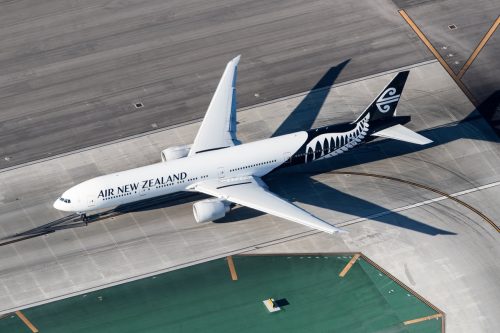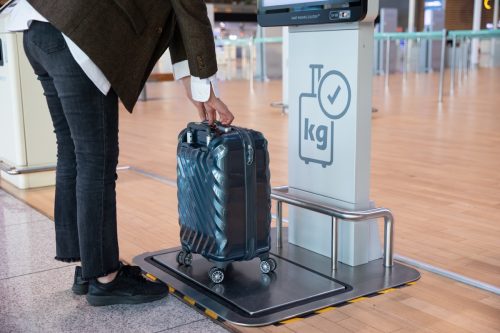Major Airlines Now Want to Weigh You Before Flights
Certain carriers are asking passengers to step on the scale before boarding.

Getting through the airport can be a painstakingly tedious process. You have to check your baggage and make sure it's the correct weight. You need to remove your belt and shoes before going through security. And after all that, you still have to find your way to your actual gate. Now, some carriers are trying to throw in another pre-boarding requirement that will likely make most travelers uncomfortable. Read on to discover why major airlines are weighing passengers before flights.
RELATED: Travelers Are Boycotting Southwest Over New Boarding Change.
Air New Zealand started weighing passengers this summer.

If you recently traveled internationally from Auckland International Airport, you may have been asked to step on a scale before your flight.
At the end of May, Air New Zealand kickstarted its passenger weight survey program to collect data on the weight load and distribution for planes, as required by the nation's Civil Aviation Authority, CNN reported.
Air New Zealand conducted the program through July 2 with the goal of collecting data from 10,000 passengers. Travelers were asked to stand on a digital scale when they checked in for their flight at Auckland International Airport, and information about their weight was then submitted anonymously to the survey.
"We weigh everything that goes on the aircraft—from the cargo to the meals onboard, to the luggage in the hold," Alastair James, the airline's load control improvement specialist, said in a statement to CNN. "For customers, crew and cabin bags, we use average weights, which we get from doing this survey."
RELATED: TSA Announces It Will Flag Certain Passengers for Extra Screening.
Now another major airline is doing the same.

Air New Zealand may have already ended its month-long passenger weighing program, but they're not the only carrier asking travelers to step on a scale.
As of Aug. 28, those flying with Korean Air may also be asked to get weighed before boarding their flight, CNBC reported. A Korean Air representative told the news outlet that they are required by law to weigh passengers and their carry-on luggage at least every five years.
Korean Air will conduct a weight survey on domestic passengers at Gimpo Airport until Sept. 6. Then from Sept. 8 to Sept. 19, passengers leaving from Incheon Airport on international flights will also be stopped for measurements, Korea JoongAng Daily reported.
"Korean Air passengers will be asked to step on scales with their carried-on items at each boarding gate," an airline official told the Korean newspaper. "The data collated anonymously will be utilized for survey purposes and doesn't mean overweight passengers will need to pay more."
RELATED: TSA Officers Just Revealed the 6 Things They "Never Do When Flying."
Some say carriers do need to weigh passengers for safety reasons.

When speaking to CNBC, the Korean Air representative said that weighing passengers before they board is "crucial for safety of flight operations."
According to a 2019 study published in the Journal of Transport and Health, many planes operate on passenger estimates that are "often out of date," as the average weight of the global population has been rising over the years. The researchers noted that certain regions with a higher rate of obesity "may begin to see significantly compromised safety margins if increasing weight tends continue."
With that in mind, Shem Malmquist, an instructor at Florida Tech's College of Aeronautics, told CNBC that airlines randomly weighing passengers to collect better data samples is likely a good idea.
"We use average weights of passengers, but people are getting a lot heavier," Malmquist explained. "Three hundred people that weigh more than average can put an airplane significantly over weight, and all of our performance calculations—runway length, climb, obstacle clearance, landing distances, altitude capabilities—all are dependent on weight, among other things."
RELATED: For more up-to-date information, sign up for our daily newsletter.
But others experts say weighing passengers is unnecessary.

Vance Hilderman, CEO of the aviation safety company Afuzion, told CNBC that it is "definitely not" reasonable for major airlines to weigh passengers—at least not for the purpose of safety, that is.
"If you're at a small Bombardier, a small Embraer jet, and we had 10 very obese people … it could make a small difference," he explained. "On commercial aircraft, anything from a 737 and above you know, 120 people, we have it built in."
According to Hilderman, aviation software can adjust for different factors including weight changes and air density. So safety isn't easily compromised, even when passenger makeup includes those who weigh more than the average traveler.
Beyond that, he told CNBC that other trends are making up for any weight differences.
"Americans are getting heavier. So are Chinese, so are Koreans," Hilderman said. "But we're also flying younger … so it's actually offset the average human's weight increase."





















